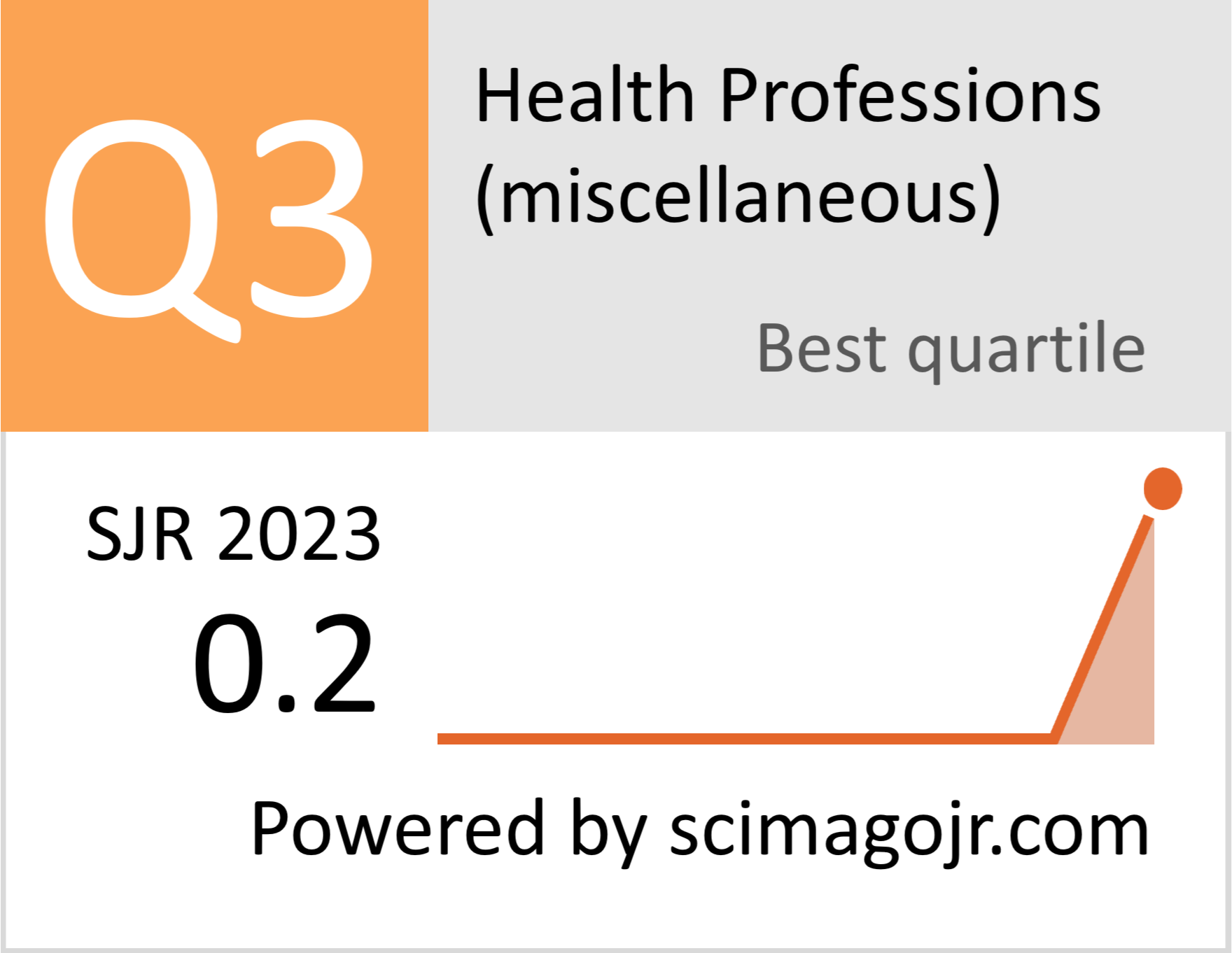Self-reported Effects of Vocal Health Promotion Videos on Teachers
Efecto autoinformado de los videos de promoción de la salud vocal en docentes

This work is licensed under a Creative Commons Attribution-NonCommercial-NoDerivatives 4.0 International License.
Show authors biography
Introduction. Guidance on vocal health promotion can benefit teachers; however, the impact of presenting such guidance in videos is not well understood.
Objective. To evaluate the self-reported effects of vocal health promotion videos on a cohort of teachers.
Method. Cross-sectional observational study. Two videos containing speech therapy guidance for voice management in both remote and resuming in-person classes during the COVID-19 pandemic were distributed to 1081 teachers. Subsequently, an online questionnaire was administered to the teachers to assess their learning from the videos, changes in vocal habits resulting from the content, specific behavioral changes, and suggestions for additional health promotion initiatives. Descriptive and inferential analyses were performed using the Mann-Whitney U test and Fisher's exact test.
Results. Thirty-three teachers participated in the study. Participants positively evaluated the videos and reported implementing changes in their vocal habits and teaching practices. They also noted post-viewing improvements in their voices. Changes in behavior included reduced smoking, increased water intake, decreased shouting and throat clearing, improved relaxation and reduced tension during classes, and improved eating habits. Most teachers indicated that remote speech therapy guidance was more accessible than in-person consultations.
Conclusion. The videos promoted self-perception and facilitated positive changes, improving the teachers’ vocal health and communication.
Article visits 528 | PDF visits 55
- Behlau M, Zambon F, Guerrieri AC, Roy N. Epidemiology of voice disorders in teachers and nonteachers in Brazil: prevalence and adverse effects. J Voice [Internet]. 2012;26(5):665.e9-665.e18. doi: https://doi.org/10.1016/j.jvoice.2011.09.010
- Van Houtte E, Claeys S, Wuyts F, Van Lierde K. The impact of voice disorders among teachers: vocal complaints, treatment-seeking behavior, knowledge of vocal care, and voice-related absenteeism. J Voice [Internet]. 2011;25(5):570-5. doi: https://doi.org/10.1016/j.jvoice.2010.04.008
- Medeiros AM de, Vieira MT. Work absenteeism due to voice disorders in Brazilian school teachers. Cad Saúde Pública [Internet]. 2019;35(Suppl1):e00171717. doi: https://doi.org/10.1590/0102-311X00171717
- Lu D, Wen B, Yang H, Chen F, Liu J, Xu Y, et al. A comparative study of the VHI-10 and the V-RQOL for quality of life among Chinese teachers with and without voice disorders. J Voice [Internet]. 2017;31(4):509.e1-509.e6. doi: https://doi.org/10.1016/j.jvoice.2016.10.025
- Lyberg-Åhlander V, Brännström KJ, Sahlén BS. On the interaction of speakers' voice quality, ambient noise and task complexity with children's listening comprehension and cognition. Front Psychol [Internet]. 2015;6:1-5. doi: https://doi.org/10.3389/fpsyg.2015.00871
- Nemr K, Simões-Zenari M, Almeida VC de, Martins GA, Saito IT. COVID-19 and the teacher’s voice: self-perception and contributions of speech therapy to voice and communication during the pandemic. Clinics [Internet]. 2021;76:e2641. doi: https://doi.org/10.6061/clinics/2021/e2641
- Cantor-Cutiva LC. Relationship Between Room Acoustics with Voice Symptoms and Voice-Related Quality of Life Among Colombian School and College Teachers During Online Classes in Times of COVID-19 Pandemic. J Voice [Internet]. Forthcoming 2022 Mar 13. doi: https://doi.org/10.1016/j.jvoice.2022.03.008
- Besser A, Lotem S, Zeigler-Hill V. Psychological Stress and Vocal Symptoms Among University Professors in Israel: Implications of the Shift to Online Synchronous Teaching During the COVID-19 Pandemic. J Voice [Internet]. 2022;36(2):291.e9-291.e16. doi: https://doi.org/10.1016/j.jvoice.2020.05.028
- Pizolato RA, Rehder MIB, Meneghim M de C, Ambrosano GMB, Mialhe FL, Pereira AC. Impact on quality of life in teachers after educational actions for prevention of voice disorders: a longitudinal study. Health Qual Life Outcomes [Internet]. 2013;11:28. doi: https://doi.org/10.1186/1477-7525-11-28
- Nallamuthu A, Boominathan P, Arunachalam R, Mariswamy P. Outcomes of Vocal Hygiene Program in Facilitating Vocal Health in Female School Teachers with Voice Problems. J Voice [Internet]. 2023;37(2):295.e11-295.e22. doi: https://doi.org/10.1016/j.jvoice.2020.12.041
- Grillo EU. A Nonrandomized Trial for Student Teachers of an In-Person and Telepractice Global Voice Prevention and Therapy Model with Estill Voice Training Assessed by the VoiceEvalU8 App. Am J Speech Lang Pathol [Internet]. 2021;30(2):566-83. doi: https://doi.org/10.1044/2020_AJSLP-20-00200
- Penha PB da C, Lima Filho LM de A, Ferreira LP, de Almeida AAF, Lopes LW, Silva MF de L. Effectiveness of a Blended-Learning Intervention in Teachers' Vocal Health. J Voice [Internet]. 2023;37(4):635.e1-635.e13. doi: https://doi.org/10.1016/j.jvoice.2021.03.012
- Aoki MC de S, Santos RS, Brasolotto AG. Presentation and evaluation of the Teacher's Vocal Health Guide. J Voice [Internet]. 2022;36(4):531-7. doi: https://doi.org/10.1016/j.jvoice.2020.07.009
- Marçal CCB, Heidemann ITSB, Durand MK, Rumor PCF, Arakawa-Belaunde AM, de Souza JM. Salutogenic resources for promoting teachers’ vocal health. Rev CEFAC [Internet]. 2021;23(3):1-10. doi: https://doi.org/10.1590/1982-0216/202123310320
- Porcaro CK, Howery S, Suhandron A, Gollery T. Impact of Vocal Hygiene Training on Teachers' Willingness to Change Vocal Behaviors. J Voice [Internet]. 2021;35(3):499.e1-499.e11. doi: https://doi.org/10.1016/j.jvoice.2019.11.011
- Byeon H, Cha S. Evaluating the effects of smoking on the voice and subjective voice problems using a meta-analysis approach. Sci Rep [Internet]. 2020;10(1):4720. doi: https://doi.org/10.1038/s41598-020-61565-3
- Byeon H. The Risk Factors Related to Voice Disorder in Teachers: A Systematic Review and Meta-Analysis. Int J Environ Res Public Health [Internet]. 2019;16(19):1-14. doi: https://doi.org/10.3390/ijerph16193675
- Rossi-Barbosa LAR, Barbosa MR, Morais RM, de Sousa KF, Silveira MF, Gama ACC, et al. Self-Reported Acute and Chronic Voice Disorders in Teachers. J Voice [Internet]. 2016;30(6):755.e25-755.e33. doi: https://doi.org/10.1016/j.jvoice.2015.08.003
- Furnas DW, Wingate JM. The Effects of Mask Usage on Reported Vocal Health of Educators. J Voice [Internet]. Forthcoming 2022 May 31. doi: https://doi.org/10.1016/j.jvoice.2022.04.011
- Nemr K, Simões-Zenari M, Cologis VCA, Martins GA, Saito IT, Gonçalves RS. COVID-19 and Remote Learning: Predictive Factors of Perceived Improvement or Worsening of the Voice in Brazilian Teachers. J Voice [Internet]. 2024;38(1):246.e27-246.e38. doi: https://doi.org/10.1016%2Fj.jvoice.2021.08.010
- Cardoso R, Lumini-Oliveira J, Meneses RF. Associations between Posture, Voice, and Dysphonia: A Systematic Review. J Voice [Internet]. 2019;33(1);124.e1-124.e12. doi: https://doi.org/10.1016/j.jvoice.2017.08.030
- Vio F, Yañez M, González CG, Fretes G, Salinas J. Teachers’ self-perception of their dietary behavior and needs to teach healthy eating habits in the school. J Health Psychol [Internet]. 2018;23(8):1019-27. doi: https://doi.org/10.1177/1359105316642003
- Souza LBR, Santos MMD. Body mass index and acoustic voice parameters: is there a relationship? Braz J Otorhinolaryngol [Internet]. 2018;84(4):410-5. doi: https://doi.org/10.1016/j.bjorl.2017.04.003
- Ricci G, Wolf AE, Barbosa AP, Moreti F, Gielow I, Behlau M. Signs and symptoms of laryngopharyngeal reflux and its relation to complaints and vocal quality. CoDAS [Internet]. 2020;32(5):1-5. doi: https://doi.org/10.1590/2317-1782/20202018052
- Fontes VS, de Oliveira CG. Food as a relevant factor to vocal health: foods that provide benefits and harm effects to vocal production. HU Rev [Internet]. 2016;42(1):19-25. Available from: https://periodicos.ufjf.br/index.php/hurevista/article/view/2328



